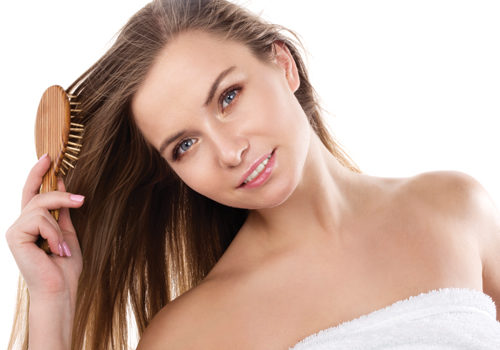Hair thinning and loss for both men and women happen for different reasons depending on the individual; some feel their fate is out of their hands as they see generations of family members before them develop shiny heads and spots while others take out the stress of the day on their scalps. Regardless, damage to hair structure is a common underlying cause. Hair strands are made up of layers, the outermost being cuticle scales that wrap around and protect the inner cortex of fiber mass (1). These cuticle scales can be broken and damaged by normal grooming habits like brushing and shampooing, and prolonged attention can cause brittleness, negatively affecting smoothness and shine as well as weakening hair, resulting in damage, thinning and the increased possibility of hair loss (1).
Still others unknowingly harm their hair with the wrong kind of products, often ones loaded with chemicals said to bring “body” and “thickness” to hair, then try to correct the negative effects of these products with more of the same. Help your customers avoid the headache by stocking up on natural hair remedies.
Get the Oils Out of the Kitchen Aisle
Olive oil made a massive leap into the market with its claims of bringing healthy, shiny hair, but another oil is making an even bigger dent in the natural food industry on all fronts: coconut. Coconut oil is growing in popularity as a condiment and cooking aid, but haircare companies are incorporating this oil into products with good reason. Studies are showing that the triglyceride-rich oil could be the trick to helping revive damaged and thinning hair.
A study by Aarti Rele and R.B. Mohile sought to compare the effects of different oils on the prevention of hair damage due to protein loss, specifically mineral oil, sunflower oil and coconut oil. Coconut oil is a triglyceride of lauric acid (a principal fatty acid) that has a low molecular weight and straight linear chain, which gives it the ability to penetrate the hair shaft (1). This is unlike mineral oil, which is a hydrocarbon and cannot penetrate; sunflower oil is also a triglyceride of lauric acid, but it has a bulky structure that is not as conducive to penetration and absorption (1).
The study tested multiple types of 25-cm long hair strands (straight, curly, wavy, permed) of varying degrees of damage by boiling, bleaching and UV-treating all hair samples and then treating the samples with the three oils. While all three oils protected the hair, according to the study’s data, coconut’s ability to penetrate into the hair cuticle made it the best at protecting damaged hair (1).
What makes many types of oils so popular is that they support shiny, healthy-looking hair without greasiness or stickiness. These include argan, lemon, lavender and rose geranium. It should be noted, though, that some oils like coconut oil may have a strong smell and a level of greasiness not found in other oils (1). Meanwhile, some oils are too astringent for some without mixing with a shampoo (like tea tree oil for dandruff care). Customers wanting to take advantage of these oils may want to consider a finished product that also incorporates other beneficial ingredients rather than just the oil itself.
Bionic Biotin
Besides oils, customers can find help in their shampoo. Shampoos for supporting fuller hair may incorporate rosemary and ginger (known for benefiting growth) or horsetail, sage or silica (which may help to thicken the hair).
Many natural haircare companies are also adding biotin to their formulas. Biotin is also known as vitamin H, a B-complex vitamin, that helps metabolize food as well as helping the nervous system. B-complex vitamins in general are known for their possible healthy skin, hair and nail supporting qualities. Although rare, a biotin deficiency can result in hair loss (2). Biotin can be found in a variety of foods (cooked eggs, nuts, legumes and mushrooms for example), but direct customers to biotin shampoo for easy access.
According to the European Food Safety Authority, which did an extensive study on all aspects of biotin, the vitamin can contribute to limiting hair loss and stimulate hair re-growth as well as aid in the care of normal hair (3), therefore benefiting any customer looking to add something new to their haircare routine.
Brush Up on Brushes
Changing up a simple part of the haircare regimen could be all it takes to improve the quality of your customers’ hair. Aggressive brushing breaks brittle hair cuticles, as well as aggravates the follicles and scalp from hair being ripped away. Stock your haircare section with a wide variety of brushes and combs and advise your hair-concerned customers to choose softer bristled brushes with wider spread teeth to help ensure less tangles and pull. For those with damaged hair, products containing wheat, silk and soy proteins may also help rejuvenate dull, dry or damaged hair.
Overall, advise your customers to be gentle to their follicles. If not, well, you know what they say: hair today, gone tomorrow. WF
References
1. A.S. Rele and R.B. Mohile, “Effect of Mineral Oil, Sunflower Oil, and Coconut Oil on Prevention of Hair Damage,” J. Cosmet. Sci. 54, 175–192 (March/April 2003), http://journal.scconline.org/pdf/cc2003/cc054n02/p00175-p00192.pdf.
2. University of Maryland Medical Center, “Vitamin H (Biotin),” www.umm.edu/altmed/articles/vitamin-h-000342.htm.
3. EFSA Panel on Dietetic Products, Nutrition and Allergies (NDA), “Biotin Related Health Claims,” EFSA Journal 2009; 7(9):1209, www.efsa.europa.eu/en/scdocs/doc/1209.pdf.
Published in WholeFoods Magazine, October 2012









